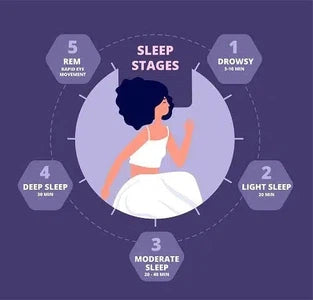In today's fast-paced world, achieving quality sleep is more challenging than ever. Sleep patterns, the rhythms that dictate when we sleep and wake, play a crucial role in our overall health and well-being. at Sleep Doctor, we are committed to enhancing your sleep experience, we recognise the importance of understanding and optimising your sleep patterns. In this guide, we'll delve into the intricacies of sleep patterns, explore common disruptions, and offer practical tips for improving sleep quality.
The Basics of Sleep Patterns
Our sleep-wake cycle is regulated by an internal biological clock known as the circadian rhythm. This rhythm operates on a roughly 24-hour cycle, influenced by factors such as light exposure, hormones, and daily routines. There are two main types of sleep: rapid eye movement (REM) sleep and non-rapid eye movement (NREM) sleep. These stages alternate throughout the night in a predictable pattern, each serving essential functions for physical and mental restoration.
Common Sleep Pattern Disruptions
Many factors can disrupt our natural sleep patterns, leading to sleep deprivation and related health issues. These disruptions include:
- Irregular Sleep Schedule: Inconsistent bedtimes and wake times can throw off your body's internal clock, making it difficult to fall asleep and wake up refreshed.
- Stress and Anxiety: Mental health conditions like stress, anxiety, and depression can disrupt sleep patterns, leading to insomnia or restless nights.
- Technology Overuse: Exposure to screens emitting blue light, such as smartphones and laptops, can interfere with the body's production of melatonin, a hormone essential for sleep regulation.
- Poor Sleep Environment: Uncomfortable mattresses, excessive noise, and improper room temperature can all contribute to sleep disturbances.
Tips for Optimizing Sleep Patterns
Improving your sleep patterns starts with establishing healthy habits and creating a conducive sleep environment. Here are some tips to help you achieve better sleep:
- Maintain a Consistent Schedule: Go to bed and wake up at the same time every day, even on weekends, to regulate your body's internal clock.
- Create a Relaxing Bedtime Routine: Engage in calming activities before bed, such as reading, meditating, or taking a warm bath, to signal to your body that it's time to wind down.
- Upgrade Your Mattress: Invest in a high-quality mattress that provides adequate support and comfort for your body type and sleep preferences. Visit our website to explore our range of mattresses designed to promote better sleep.
- Limit Screen Time: Avoid using electronic devices at least an hour before bedtime, or use blue light filters to minimize the impact of screen exposure on your sleep quality.
- Optimize Your Sleep Environment: Keep your bedroom dark, quiet, and cool to create an optimal sleep environment. Consider using blackout curtains, white noise machines, or a comfortable mattress to enhance your sleep experience.
Understanding and optimizing your sleep patterns is essential for achieving restorative sleep and improving your overall health and well-being. By incorporating healthy sleep habits and creating a conducive sleep environment, you can enhance the quality of your sleep and wake up feeling refreshed and rejuvenated. Visit our mattress website to explore our range of products designed to support better sleep and start your journey to a healthier, more restful night's sleep today.

